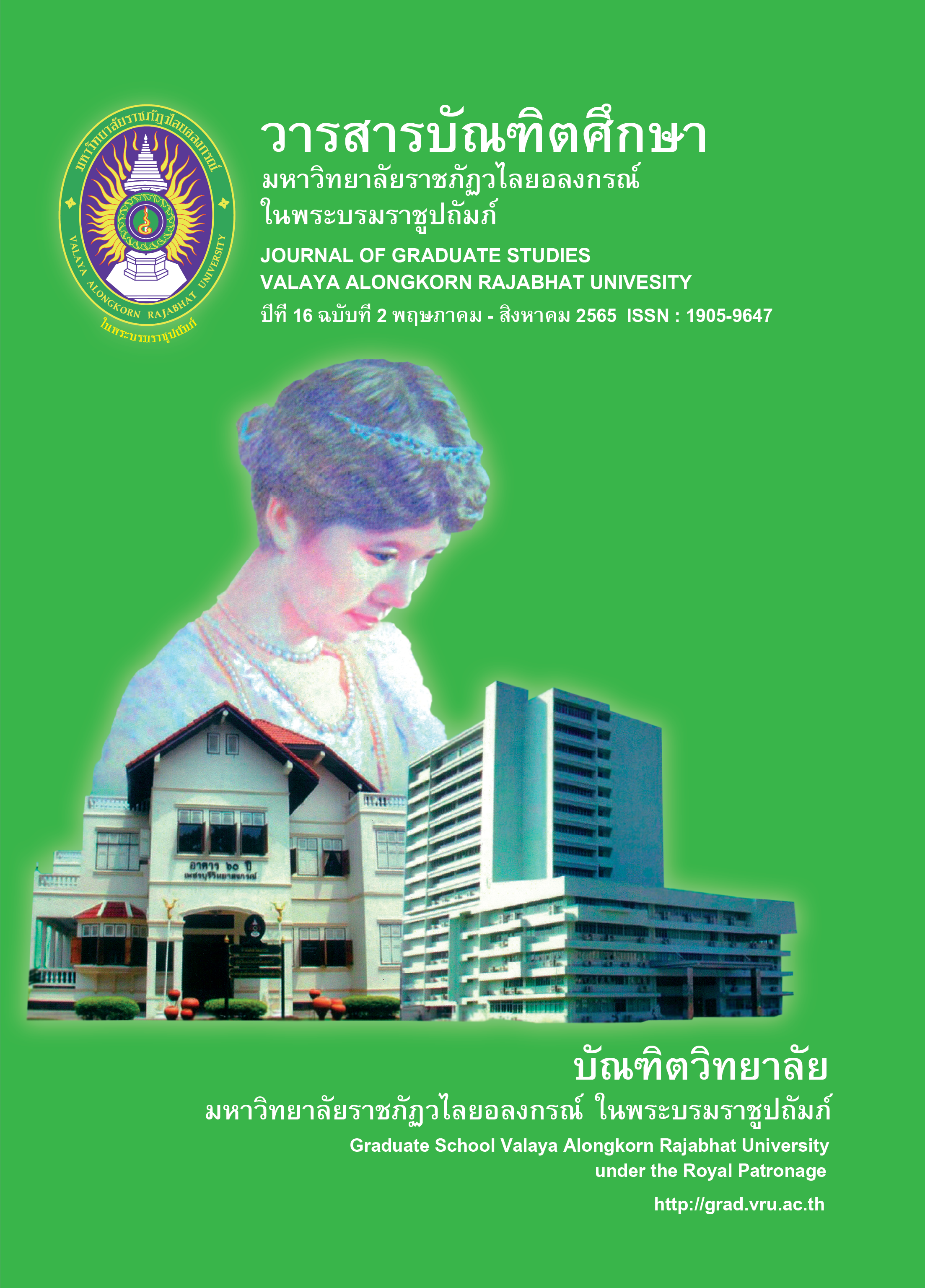ONLINE LEARNING COMMUNITIES MODEL TO ENHANCE KNOWLEDGE MANAGEMENT IN RESEARCH FOR GRADUATE STUDIES, SUKHOTHAI THAMMATHIRAT OPEN UNIVERSITY
Main Article Content
Abstract
The purposes of this research were to develop an online learning communities model to enhance knowledge management in research for graduate studies, Sukhothai Thammathirat Open University. The research process is divided into four phases. The first phase was to study the concepts, theories, relevant research principles and study the needs of the online Learning communities model to enhance knowledge management in research for graduate studies. The samples in the research were 74 lecturers and 151 students. The second phase was to create (draft) model of online learning communities to enhance knowledge management. The third phase was to develop and validate the online learning community model to enhance knowledge management. The sample in the research was 42 students. And the last phase was to edit the online learning community model and evaluate quality by experts / present research reports. Research instruments were 1) questionnaire 2) online learning communities model quality assessment form 3) online learning communities system 4) quiz and
5) behavioral observation form.
The research found that online learning communities model to enhance knowledge management in research for graduate studies, Sukhothai Thammathirat Open University consists of 6 steps: 1) create 2) select 3) adapt 4) keep 5) manage and 6) publish. There are 5 elements of online learning communities model namely
1) people 2) activity 3) supporting 4) tools on web and 5) knowledge. The research found that people, supporting and tools on web are most appropriate ( = 4.80, SD=0.45) and step of publish is most appropriate (
= 4.80, SD=0.45). Graduate students have learning achievement after using online learning communities model higher than before using at .05 significant level and they have highest mean in the ability to write research projects in the name of the project followed by having the opportunity to successfully research and write research questions, research objectives and research hypothesis. Graduate students have satisfied with the online learning community as a whole at the highest level which is satisfied with the media and the media type, the most infographic is the average of 4.70.
Article Details

This work is licensed under a Creative Commons Attribution-NonCommercial-NoDerivatives 4.0 International License.
บทความทุกเรื่องได้รับการตรวจความถูกต้องทางวิชาการโดยผู้ทรงคุณวุฒิ ทรรศนะและข้อคิดเห็นในบทความ Journal of Global of Perspectives in Humanities and Social Sciences (J-GPHSS) มิใช่เป็นทรรศนะและความคิดของผู้จัดทำจึงมิใช่ความรับผิดชอบของบัณฑิตวิทยาลัย มหาวิทยาลัยราชภัฏวไลยอลงกรณ์ ในพระบรมราชูปถัมภ์ กองบรรณาธิการไม่สงวนสิทธิ์การคัดลอก แต่ให้อ้างอิงแหล่งที่มา
References
Hongto, W., & Thammametha, T. (2012). kānphatthanā rūpbǣp chumchon kānrīanrū ʻō̜nlai dōi chai krabūankān sāng khwāmrū phư̄a kānsāng nawatkamkān rīan kānsō̜n khō̜ng khrū phū sō̜n wichā khō̜mphiutœ̄ [The Development of an Online Learning Community Model Using Knowledge Creation Process to Create Instructional Innovation of Computer Teachers]. Retrieved from https://www.tci-thaijo.org/index.php/suedureasearchjournal/article/view/6954/5997.
Judge, S. K, Osman, K., & Yassin, S. F. M. (2011). Cultivating communication through PBL with ICT. Procedia Social and Behavioral Sciences, 15, 1546–1550.
Nasongkhla, J. (2005). kānʻō̜kbǣp kān rīan kānsō̜n bon wep nai rabop kān rīan ʻilekthrō̜nik [Web-based instruction in E-learning system]. Bangkok: Center for Documents and Textbooks, Faculty of Education.
Netwong, T. (2010). kānphatthanā rūpbǣp kān rīan rūam phư̄a sāng chumchon kānrīanrū ʻō̜nlai læ phon samrit thāngkān rīan wichā theknōlōyī sārasonthēt samrap naksưksā parinyā bandit [Development of a mainstreaming model to develop online learning community and learning achievement in information technology for undergraduate student]s. Doctoral Dissertation, Bangkok: Chulalongkorn University
Panich, W. (2008). Knowledge Management: Practice Edition. The Knowledge Management Institute Foundation. Bangkok.
Sacchanand, C. (2011). Graduate Research and Development. Retrieved from https://ph02.tci-thaijo.org/index.php/gskku/article/download/22901/1958.
Shan Li, Juan Zheng & Yunfeng Zheng. (2021). Towards a new approach to managing teacher online learning: Learning communities as activity systems. The Social Science Journal, 58(3), 383-395, DOI: 10.1016/j.soscij.2019.04.008
Tiantong, M. (2013). nawattakam: kān rīan kānsō̜n dūai khō̜mphiutœ̄ [Innovation: Computer Teaching]. Bangkok: Danex Intercorporation Company Limited.
Tseng, H. (2020). An exploratory study of students’ perceptions of learning management system utilisation and learning community. Research in Learning Technology, 28. https://doi.org/10.25304/rlt.v28.2423.
Yu Chu Yeh, (2010). Knowledge management in blended learning: Effects on professional development in creativity instruction. Computers & Education 56(1), 146-156.


